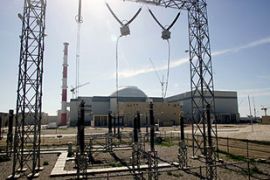Iran to power up nuclear reactor
Country’s first nuclear power plant to come online after years of delays.

The fuel-loading process scheduled to begin on Saturday will mean the facility is officially recognised as a nuclear reactor under international terms.
“It is a big day. Iran has been waiting for it for years. Bushehr has seen the start up postponed so many times that Iranians will breathe a sigh of relief,” Mark Fitzpatrick, of London’s International Institute for Strategic Studies said.
However, the full operation is expected to take at least a week and it will be more than two months before it begins generating electricity.
Russian safeguards
Russia, under agreements signed by Iran, has pledged to safeguard the plant and spent nuclear fuel will be shipped back to Russia for reprocessing.
Iran has said UN nuclear-agency experts will be able to verify none of the waste is diverted for other uses. The uranium fuel used at Bushehr is well below the more than 90 per cent enrichment needed for a nuclear warhead.
The US, Israel and other nations maintain deep suspicion of Iran’s nuclear programme, but do not specifically object to Iran’s ability to build peaceful nuclear reactors that are under international scrutiny.
| in depth | |||||||||||||||||||||
|
Iran has repeatedly denied it is seeking to build atomic weapons and claims it has a right to produce its own fuel for several nuclear power plants it plans to build for civilian use.
However, the US and its allies have repeatedly criticised Iran’s plans to enrich uranium, a process that can be used to make material for atomic weapons, but is also needed to make nuclear fuel.
In March, Iran said it would begin construction on the first of 10 new uranium enrichment sites in defiance of UN sanctions.
Despite working on the Bushehr reactor since 1995, Russia has backed the UN’s latest sanctions on Iran.
Russian officials argue that starting up the facility will require Iran to increase its co-operation with UN nuclear inspectors and possibly lead Iran to resume talks over its uranium enrichment programme.
Mahmoud Ahmadinejad, the Iranian president, reiterated on Friday that his country was willing to return to negotiations with the six major nuclear powers – the five permanent UN Security Council members plus Germany – about its nuclear programme.
He also said that Iran could stop its advanced uranium enrichment programme if a deal to ensure nuclear fuel supplies was reached.
“We promise to stop enriching uranium to 20 percent purity if we are ensured fuel supply,” Ahmadinejad was quoted as saying in an interview with Japan’s Yomiuri Shimbun newspaper.
Long-delayed reactor
The long-delayed Bushehr project dates backs to 1974, when Iran’s US-backed Shah Mohammed Reza Pahlavi contracted the German company Siemens to build the reactor.
The company withdrew from the project after the 1979 Islamic Revolution toppled the shah. The partially finished plant was later damaged after it was bombed during the 1980-88 war with Iraq.
Before making the Russian deal to complete Bushehr, Iran signed pacts with Argentina, Spain and other countries only to see them cancelled under US pressure.
Ali Ansari, an Iran expert at Scotland’s St Andrews University, said that the technology at the site was outdated after years of delays.
“It will obviously have a very theatrical opening but the delays have meant that the power plant is a very old model and the contribution to the national grid is very small,” he said.
Other reactors
Iran has said it plans to build other reactors and designs for a second rector in southwestern Iran are already taking shape.
Sergei Ryabkov, Russia’s deputy foreign minister, said that his country could co-operate with Iran on future reactors.
“The UN Security Council resolutions have not placed any limits on co-operation with Iran in building light-water … reactors, which are the most secure in terms of proliferation,” the Interfax news agency quoted Ryabkov as saying.
“And we see no reason why such co-operation cannot be continued. It is mutually beneficial and, most important, presents no risk.”
